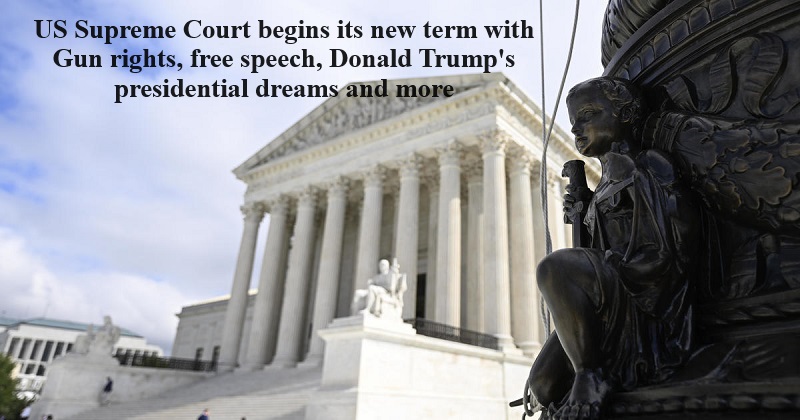
The commencement of the new term for the United States Supreme Court is on the horizon, and it brings with it a slate of contentious cases that touch upon various contentious issues, including gun rights, free speech, and even the potential resurgence of Donald Trump’s presidential aspirations.
The Supreme Court, as reported by AFP, is presently divided along two lines: a 6-3 or 3-3 division. The conservative majority is evident, with three justices appointed by the former President Trump, namely Neil Gorsuch, Brett Kavanaugh, and Amy Coney Barrett. The remaining two conservative justices, Clarence Thomas and Samuel Alito, were designated by Republican Presidents George HW Bush and George W Bush. Chief Justice John Roberts, who generally aligns with the conservative bloc, further bolsters this majority. On the opposing side, the liberal wing comprises Elena Kagan, Sonia Sotomayor, and Ketanji Brown Jackson, all appointed by Democratic presidents.
David Cole, the legal director of the American Civil Liberties Union (ACLU), expressed the anticipation that this upcoming Supreme Court session will offer insights into the court’s ideological leanings. He raised the question of whether it is a 6-3 divided court or, as some suggest, a 3-3-3 court, with the three Democratic appointees, three staunch conservatives in Alito, Thomas, and Gorsuch, and three moderate figures in Roberts, Kavanaugh, and Barrett shaping the court’s decisions.
Among the cases on the docket is one with implications for the control of the US House of Representatives. The case centers around a congressional map in South Carolina that critics argue unconstitutionally discriminates against African American voters, who predominantly vote for Democrats. This case could influence the current Republican majority in the House.
Another pivotal case pertains to Trump’s potential return to the White House. Several states have initiated legal proceedings to prevent his appearance on the presidential ballot, citing his alleged incitement of the January 6, 2021, attack on Congress as a violation of his oath of office.
The Supreme Court will also tackle issues related to gun rights and free speech. In November, the court will address a challenge to a law prohibiting individuals with domestic violence orders from possessing firearms. Additionally, a high-profile free speech case involving social media platforms like Facebook and Twitter is on the agenda, challenging laws in Texas and Florida that restrict the moderation of content by these platforms.
Another free speech case revolves around a California lawyer’s attempt to trademark the phrase “Trump too small,” intended for mocking the former president. The US Patent and Trademark Office rejected the trademark due to concerns that the lawyer lacked Trump’s written consent to use his name.
Finally, the docket may include cases related to abortion pill restrictions and transgender rights, adding further complexity and significance to this term for the United States Supreme Court.

Post Your Comments